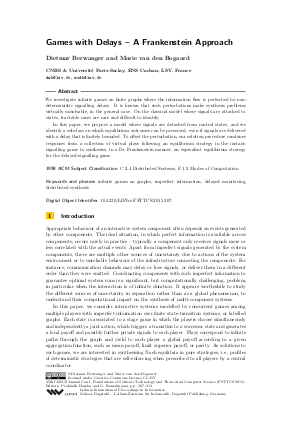Games with Delays - A Frankenstein Approach
Authors Dietmar Berwanger, Marie van den Bogaard
-
Part of:
Volume:
35th IARCS Annual Conference on Foundations of Software Technology and Theoretical Computer Science (FSTTCS 2015)
Part of: Series: Leibniz International Proceedings in Informatics (LIPIcs)
Part of: Conference: IARCS Annual Conference on Foundations of Software Technology and Theoretical Computer Science (FSTTCS) - License:
 Creative Commons Attribution 3.0 Unported license
Creative Commons Attribution 3.0 Unported license
- Publication Date: 2015-12-14
File

PDF
LIPIcs.FSTTCS.2015.307.pdf
- Filesize: 401 kB
- 13 pages
Document Identifiers
Subject Classification
Keywords
- infinite games on graphs
- imperfect information
- delayed monitoring
- distributed synthesis
Metrics
- Access Statistics
-
Total Accesses (updated on a weekly basis)
0Document
0Metadata
Abstract
We investigate infinite games on finite graphs where the information flow is perturbed by non- deterministic signalling delays. It is known that such perturbations make synthesis problems virtually unsolvable, in the general case. On the classical model where signals are attached to states, tractable cases are rare and difficult to identify. In this paper, we propose a model where signals are detached from control states, and we identify a subclass on which equilibrium outcomes can be preserved, even if signals are delivered with a delay that is finitely bounded. To offset the perturbation, our solution procedure combines responses from a collection of virtual plays following an equilibrium strategy in the instant- signalling game to synthesise, in a Dr. Frankenstein manner, an equivalent equilibrium strategy for the delayed-signalling game.
Cite As Get BibTex
Dietmar Berwanger and Marie van den Bogaard. Games with Delays - A Frankenstein Approach. In 35th IARCS Annual Conference on Foundations of Software Technology and Theoretical Computer Science (FSTTCS 2015). Leibniz International Proceedings in Informatics (LIPIcs), Volume 45, pp. 307-319, Schloss Dagstuhl – Leibniz-Zentrum für Informatik (2015)
https://doi.org/10.4230/LIPIcs.FSTTCS.2015.307
BibTex
@InProceedings{berwanger_et_al:LIPIcs.FSTTCS.2015.307,
author = {Berwanger, Dietmar and van den Bogaard, Marie},
title = {{Games with Delays - A Frankenstein Approach}},
booktitle = {35th IARCS Annual Conference on Foundations of Software Technology and Theoretical Computer Science (FSTTCS 2015)},
pages = {307--319},
series = {Leibniz International Proceedings in Informatics (LIPIcs)},
ISBN = {978-3-939897-97-2},
ISSN = {1868-8969},
year = {2015},
volume = {45},
editor = {Harsha, Prahladh and Ramalingam, G.},
publisher = {Schloss Dagstuhl -- Leibniz-Zentrum f{\"u}r Informatik},
address = {Dagstuhl, Germany},
URL = {https://drops.dagstuhl.de/entities/document/10.4230/LIPIcs.FSTTCS.2015.307},
URN = {urn:nbn:de:0030-drops-56575},
doi = {10.4230/LIPIcs.FSTTCS.2015.307},
annote = {Keywords: infinite games on graphs, imperfect information, delayed monitoring, distributed synthesis}
}
Author Details
References
-
Salman Azhar, Gary Peterson, and John Reif. Lower bounds for multiplayer non-cooperative games of incomplete information. Journal of Computers and Mathematics with Applications, 41:957-992, 2001.

-
Dietmar Berwanger, Łukasz Kaiser, and Bernd Puchala. Perfect-information construction for coordination in games. In Foundations of Software Technology and Theoretical Computer Science (FSTTCS 2011), Proc., volume 13 of Leibniz International Proceedings in Informatics, pages 387-398, Mumbai, India, December 2011. Leibniz-Zentrum für Informatik.

-
Patricia Bouyer, Romain Brenguier, Nicolas Markey, and Michael Ummels. Nash equilibria in concurrent games with Büchi objectives. In Foundations of Software Technology and Theoretical Computer Science (FSTTCS 2011), Proc., volume 13 of LIPIcs, pages 375-386. Schloss Dagstuhl - Leibniz-Zentrum für Informatik, 2011.

-
Patricia Bouyer, Romain Brenguier, Nicolas Markey, and Michael Ummels. Pure Nash equilibria in concurrent games. Logical Methods in Computer Science, 11(2:9), June 2015.

-
Thomas Brihaye, Véronique Bruyére, and Julie De Pril. On equilibria in quantitative games with reachability/safety objectives. Theory of Computing Systems, 54(2):150-189, 2014.

-
Krishnendu Chatterjee, Laurent Doyen, Emmanuel Filiot, and Jean-François Raskin. Doomsday equilibria for omega-regular games. In KennethL. McMillan and Xavier Rival, editors, Verification, Model Checking, and Abstract Interpretation, volume 8318 of Lecture Notes in Computer Science, pages 78-97. Springer Berlin Heidelberg, 2014.

-
B. Finkbeiner and S. Schewe. Uniform distributed synthesis. In Logic in Computer Science (LICS'05), Proc., pages 321-330. IEEE, 2005.

-
Drew Fudenberg, Yuhta Ishii, and Scott Duke Kominers. Delayed-response strategies in repeated games with observation lags. J. Economic Theory, 150:487-514, 2014.

-
Hugo Gimbert and Edon Kelmendi. Two-player perfect-information shift-invariant submixing stochastic games are half-positional. CoRR, abs/1401.6575, 2014.

-
Orna Kupferman and Moshe Y. Vardi. Synthesizing distributed systems. In Logic in Computer Science (LICS'01), Proc., pages 389-398. IEEE Computer Society Press, June 2001.

-
Gary L. Peterson and John H. Reif. Multiple-Person Alternation. In Proc 20th Annual Symposium on Foundations of Computer Science, (FOCS 1979), pages 348-363. IEEE, 1979.

-
Amir Pnueli and Roni Rosner. Distributed reactive systems are hard to synthesize. In Proceedings of the 31st Annual Symposium on Foundations of Computer Science, (FoCS '90), pages 746-757. IEEE Computer Society Press, 1990.

-
Dinah Rosenberg, Eilon Solan, and Nicolas Vieille. Stochastic games with imperfect monitoring. In Alain Haurie, Shigeo Muto, LeonA. Petrosjan, and T.E.S. Raghavan, editors, Advances in Dynamic Games, volume 8 of Annals of the International Society of Dynamic Games, pages 3-22. Birkhäuser Boston, 2006.

-
Eran Shmaya. The determinacy of infinite games with eventual perfect monitoring. Proc. Am. Math. Soc., 139(10):3665-3678, 2011.

-
Michael Ummels. The complexity of Nash equilibria in infinite multiplayer games. In Roberto Amadio, editor, Foundations of Software Science and Computational Structures, volume 4962 of Lecture Notes in Computer Science, pages 20-34. Springer Berlin Heidelberg, 2008.

-
Michael Ummels and Dominik Wojtczak. The complexity of Nash equilibria in limit-average games. In Joost-Pieter Katoen and Barbara König, editors, CONCUR 2011 – Concurrency Theory, volume 6901 of Lecture Notes in Computer Science, pages 482-496. Springer Berlin Heidelberg, 2011.

-
Michael Ummels and Dominik Wojtczak. The complexity of Nash equilibria in stochastic multiplayer games. Logical Methods in Computer Science, 7(3), 2011.

